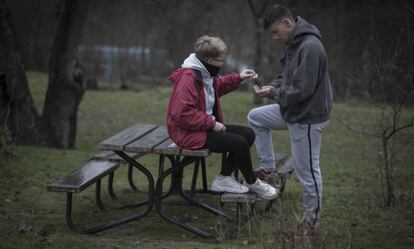Controlling teen drug use: Prevention versus intervention
Pediatricians and lawmakers are dubious about a non-binding motion in the Canary Islands to allow drug tests on teenagers at their parents’ request


The parliament of the Canary Islands urged its regional government last week to include a drug test when 14-year-old teenagers get their health check-up, should the parents request it. According to the non-binding motion, this could be a significant preventive measure.
But do parents have the right to make their children undergo the test? Pediatricians and lawyers argue that there are other less aggressive approaches to the problem, but, in any event, the consent of the teenager is vital.
There are other means of prevention. This is not the right one Agustín Graffigna, Primary Healthcare Pediatricians Association
So where does prevention end and intervention begin in the lives of adolescents under the age of consent?
The motion was approved by 44 votes with only six abstentions from the anti-austerity party United Podemos. The arguments in favor claimed the average age teenagers begin to consume alcohol, tobacco and cannabis had fallen significantly and there was a need to step up prevention within families and schools. It was added that among young people on the Canary Islands, regular use of heroin, hallucinogens, amphetamines, cocaine and ecstasy was not generally perceived as particularly risky. It made sense then to introduce blood and urine tests to provide a safety net for 14 year olds who could become involved in substance abuse.
“We were surprised by the news,” says Agustín Graffigna, president of the Primary Healthcare Pediatricians Association in the Canary Islands. “There has been no referral to an assessment from the scientific community. Sending someone for analysis should be based on medical criteria, not on the criteria of the parents. Making this test generally applicable is not a measure that has been addressed in any of the guidelines,” he adds, pointing out that it is not included in established protocol in Catalonia, Valencia or in Basque Country. “There are other means of prevention. This is not the right one. And in practice, it would have to be with the consent of the minor. Otherwise, we would be invading their privacy with an aggressive examination, which is what analysis is. It would break their trust in the doctor and it is very important that they trust our advice.”
Sources from the Department of Health have stated that they are unable to comment on the motion as the wording has still not been finalized. The document containing the motion as it stands has been posted on the Parliament’s webpage. It was the ruling Canaries Coalition that amended the original motion to propose that the tests should only be done at the specific request of the parents as opposed to simply with their consent.
If someone has a better idea, let’s hear it because the measures we use now don’t work
Popular Party deputy Astrid Pérez
The other amendment, put forward by the Socialist Party (PSOE), suggested that parents be provided with the appropriate information and given the chance to express their fears and ask questions should the results prove positive.
“Minors have the same basic rights as people over the age of consent. But what happens is that in some cases these rights are exercised through other people, such as their parents or tutors,” says Miguel Presno, professor of constitutional law at Oviedo University. “What is at stake here is the physical and moral integrity of the adolescent – the right not to have any physical intervention without their consent; their right to privacy.”
“With regards to the autonomy of the patient, the law specifies that there can be no intervention without informing the patient first and this does not distinguish between minors and those over the age of consent,” he explains. “There are a few exceptions. For example, when the patient is unconscious or is unable to understand the intervention. In this case, however, the adolescents are not unconscious; nor is it possible that a 14 year old does not know what a drugs test is. According to current legislation, once a minor has sufficient maturity, they should be listened to – and always over the age of 12. If a child of 14 can stand up to give evidence in court, they have the sense to be able to choose if he should undergo a test.”
According to the Popular Party (PP) deputy Astrid Pérez, who proposed the motion in the first place, however, “Parents not only have a right, we also have a duty to look out for the interests of minors until they turn 18. If we can’t decide things for our own children, we should bring down the legal age. Before proposing the initiative, I consulted pediatricians and drug addiction units. Most said that it was a fantastic idea. The measure would be a plus and would not be a measure designed to go against anyone’s interests. If someone has a better idea, let’s hear it because the measures we use now don’t work.”
Knowing your child
The doctors who were consulted insist it is more useful to analyze the environment your child lives in than test them for drugs. “Except in very specific cases, and always with their consent, these tests are useless and won’t tell us anything that a look into their circumstances wouldn’t throw up – family, friends, studies, hobbies,” says José Galbe, a specialist in addiction who works in Zaragoza and is a member of the Spanish Association of Pediatrics in Primary Healthcare. “Children give us a lot of clues. It’s very important that the parents communicate with them and know who they are spending time with. If the test looked useful, I would speak to the adolescent. If they said no, I wouldn’t carry it out. I would tell the parents to get a court order.”
What is at stake here is the physical and moral integrity of the adolescent Miguel Presno, professor of constitutional law
Natalia Velilla, a magistrate with the Francisco de Vitoria Association, considers it unlikely that a judge would agree to such a court order. “It’s not a matter of life and death,” she says. “As far as vaccinations are concerned, it’s different because it’s a question of public health. But in this case we’re talking about parental authority – the parents want to find out if their child is taking drugs and there are other ways of finding this out. The judge would reject the request as disproportionate. It’s like killing flies with a sledgehammer.”
If a parent currently asks for a drugs test, it is up to the doctor to decide how to proceed. “I’ve never been asked,” says pediatrician María Eugenia Angulo who has spent 16 years in primary healthcare and now works in a health center in Las Palmas in Gran Canaria. “We have a duty to inform the patient. Not long ago, a boy of 12 didn’t want to be examined. I tried to convince him but he refused and I couldn’t force him to do it.”
Félix Notario, from the Spanish Society of Adolescent Medicine and a pediatrician at a clinic in Albacete, believes that the measures would not be effective and their introduction is simply a way for politicians to salve their own conscience. “There’s no need for so many tests,” he says. “One out of four teenagers have consumed substances between the ages of 14 and 18. If we wait for a test to tell us that our 14 year old is taking drugs, then we’re coming in late.”
“Real prevention should be done within the family”
Alcohol is the most common mind-altering substance among teenagers between the ages of 14 and 18. According to a 2016 Estudes survey carried out by the National Drugs Plan, 76.9% have drunk alcohol at some point. "In Spanish society, the biggest problems are alcohol and cannabis," says pediatrician Félix Notario, from the Spanish Society of Adolescent Medicine.
The study reveals that 31.1% of Spaniards in this age bracket have experimented with cannabis at some point in their lives and that 38.5% have tried tobacco. The average age to start consuming cannabis is 14.8 and, in the case of tobacco, 14.1 (14.6 for daily consumption). Meanwhile, 14 is the average age teenagers started drinking alcohol, though weekly consumption does not start on average until they are 15.1.
“Real prevention should be done within the family, as in looking out for symptoms such as poor performance at school, an unusual lack of energy, little interest in activities, mental health issues, difficulty sleeping and eating, signs of depression, anxiety and being distant with friends or family,” says Notario.
In the Children’s Health Program launched by the Canary Islands Health Service, there is information on how doctors should act when talking about harmful substances with teenagers. They should, it says, win their trust and respect their privacy. “The idea is to try to get through to youngsters by making them understand the physical, mental and social risks rather than laying down the law – by trying to reduce the social appeal of these substances while informing them about the harmful short and long-term effects,” says the program.
“After that, it is advisable to follow the Canary Health Service code of conduct, as if dealing with an adult. If the child does not smoke, a quick piece of advice should be offered, with no moral posturing.” The same applies to alcohol.
English version by Heather Galloway.
Tu suscripción se está usando en otro dispositivo
¿Quieres añadir otro usuario a tu suscripción?
Si continúas leyendo en este dispositivo, no se podrá leer en el otro.
FlechaTu suscripción se está usando en otro dispositivo y solo puedes acceder a EL PAÍS desde un dispositivo a la vez.
Si quieres compartir tu cuenta, cambia tu suscripción a la modalidad Premium, así podrás añadir otro usuario. Cada uno accederá con su propia cuenta de email, lo que os permitirá personalizar vuestra experiencia en EL PAÍS.
¿Tienes una suscripción de empresa? Accede aquí para contratar más cuentas.
En el caso de no saber quién está usando tu cuenta, te recomendamos cambiar tu contraseña aquí.
Si decides continuar compartiendo tu cuenta, este mensaje se mostrará en tu dispositivo y en el de la otra persona que está usando tu cuenta de forma indefinida, afectando a tu experiencia de lectura. Puedes consultar aquí los términos y condiciones de la suscripción digital.








































